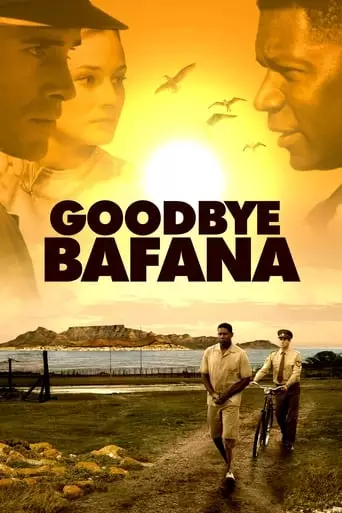
The true story of a white South African racist whose life was profoundly altered by the black prisoner he guarded for twenty years. The prisoner’s name was Nelson Mandela.
Goodbye Bafana, directed by Bille August, explores the transformative relationship between Nelson Mandela and his prison guard, James Gregory, during Mandela’s incarceration on Robben Island. The film is based on Gregory’s memoir Goodbye Bafana: Nelson Mandela, My Prisoner, My Friend. It portrays Gregory as a man initially complicit in the apartheid system but profoundly changed through his interactions with Mandela. The story also delves into Gregory’s personal life, showing how his evolving perspective affects his relationship with his wife and family as he witnesses the resilience and humanity of Mandela. Set in apartheid-era South Africa, the film offers a lens into Mandela’s influence even from within the confines of prison.
The film juxtaposes personal transformation with political upheaval. James Gregory serves as a proxy for the white South African population, representing the ignorance and complicity that apartheid thrived on. His journey from a loyal enforcer of apartheid policies to a man deeply empathetic toward Mandela’s cause is the heart of the narrative. Mandela’s quiet dignity and moral conviction serve as the catalyst for this transformation, emphasizing the power of individual integrity to inspire change.
While the film attempts to humanize Gregory and explore his complex relationship with Mandela, it has been critiqued for framing Mandela’s story through the perspective of a white character, arguably diminishing the agency of Mandela and other black South Africans in their own struggle.
The movie serves as an accessible introduction to the realities of apartheid and Mandela’s legacy for global audiences. It has been praised for its performances, particularly by Joseph Fiennes as Gregory and Dennis Haysbert as Mandela. However, it has also sparked discussions about the ethics of centering narratives of systemic oppression on characters who represent the oppressors rather than the oppressed.
After watching Goodbye Bafana, you may feel a mix of emotions: admiration for Mandela’s resilience and moral fortitude, reflection on the complexities of personal and societal change, and perhaps frustration at the continued relevance of the themes of racism and oppression. The film’s hopeful message about the potential for transformation and reconciliation may leave you inspired to consider your role in promoting justice and equality in your own context.
